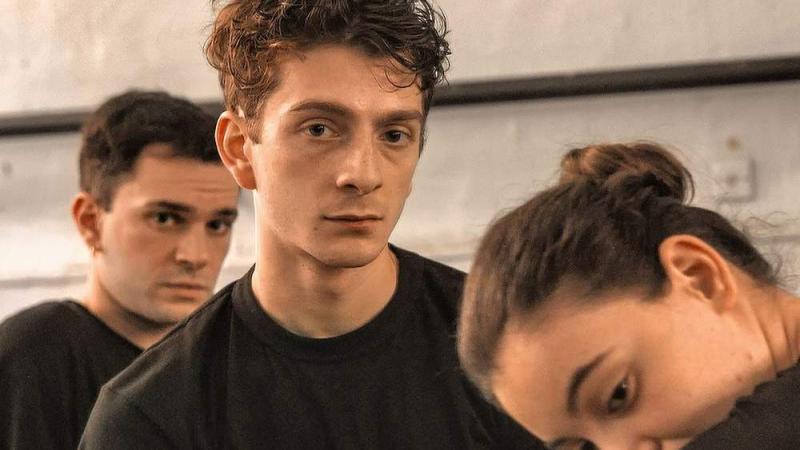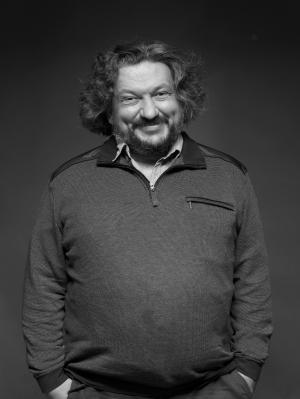10th Odessa International Film Festival review - exquisite gay love stories and visionary new music | reviews, news & interviews
10th Odessa International Film Festival review - exquisite gay love stories and visionary new music
10th Odessa International Film Festival review - exquisite gay love stories and visionary new music
Not so far from the war zone, the 'Cannes of the East' keeps the film flag flying

Odessa, the so-called "pearl of the Black Sea", is a Ukrainian city full of lovely 19th-century Italianate architecture and sandy beaches, with a reputation, even in Soviet times, for a certain bohemian sense of freedom.
The city always has had an intense creative pulse. Many writers like Isaac Babel and top classical musicians such as David Oistrakh came from the city. The estimable local English language magazine The Odessa Review (available online) has delved into the city's rich history in depth. One tale which may even be true was that it was exiles from Odessa who set up the first burlesque theatre in Paris in the 18th century, and it was known for its underground Jazz scene in Soviet times, and it was where klezmer was developed, part of the city's strong Jewish heritage.
The Russian tanks are parked only a few hours away, though not so often in the news these days, the conflict rumbles on with daily deaths. As a key part of their hybrid war, the Russians used Ukraine as an experimental media lab (before launching the 24 hour troll factories in St Petersburg dedicated to undermining the West and causing general information chaos). Ukrainians unsurprisingly don’t trust their media, let alone Russian media. One result is the queues seen at OIFF for documentaries - especially if a filmmaker can explain their work after the showing, it might just have some credibility.
OIFF doesn’t have a huge budget - one advantage is there are hardly any big stars and celebrity feeding frenzies, although Catherine Deneuve did make a brief appearance at a Q&A and got a Lifetime Award at the final ceremony in the visually stunning Opera House, with locals dressed to the nines. It’s small enough that the evening film parties are friendly and you can end up chatting to active participants whether a Georgian director, a Moldavan actor or an Austrian scriptwriter while downing mojitos or surprisingly drinkable Ukrainian wine.
The late night drink-ups are not only hedonistic but excellent for effective networking. OIFF regular, Polish director-producer Dariusz Jabłoński first discussed and put some connections together for his his major new TV project, a crime-thriller series entitled The Pleasure Principle, launched this year, one late night at OIFF. The series is the first transnational TV co-production between three Eastern European countries, with Poland, the Czech Republic and Ukraine on board and will be competing on equal terms with the latest Netflix blockbuster series. After shooting in Warsaw, Prague and on the Black Sea coast, around Odessa, the ten hour show is an engaging, fast moving “Noir Light” which unfolds in the above Eastern European cities, where several body parts belonging to young females are found on the same day.
Though in a more attractive location than many, like others the festival is worth a visit should you wish to catch up with the latest Ken Loach or Jim Jarmusch, months before they appear in the local multiplex, or profitably concentrate on the type of art films that are unlikely to be seen widely or the many local or regional films.
Several of the most talked about films had gay themes - including the gorgeous Georgian film set in a dance company Levan Akin’s And Then We Danced, (which shared the Grand Prix) and the lush and beautiful Portrait Of A Lady On Fire, the story of a portrait painter and her subject set in 18th century Brittany.
Almodóvar’s latest Pain and Glory, which had the audience applauding at a scene not seen that often on screen - two 50 something gay men kissing. A feature of the Almodóvar was the age based reaction - older critics loved its compassionate wistfulness, a partly autobiographical tale of an ageing director who has lost his mojo, while younger ones regretted its lack of edgy newness. A counterbalance to this not unwelcome gay-centrism was somehow typical of the genuine tolerance felt at the festival, as the deserved winner of the big documentary prize was the utterly engaging The Men’s Room, which followed a score of sweaty, unglamorous and unreconstructed middle aged family men, singers of a Norwegian mens’ choir as the leader succumbs to cancer and they build up to an important gig supporting Black Sabbath.
If one aim of any Festival is to increase empathy there were several films that put you effectively in the shoes of others - notably Tel Aviv On Fire, a welcome genial comedy on the Israeli-Palestine conflict, which has already proved a hit on both sides and The Orphanage set in a Kabul Orphanage in the late 1970s as Soviet Rule shifted to Islamic in Afghanistan. For the children, worship of Lenin and Allah both seem outlandish, better to trust in their own cult of being fanatics of Bollywood films.
 As the city is a longstanding musical powerhouse, it seemed appropriate that some of the most memorable evenings were musical events attached to the festival - British cabaret group The Tiger Lillies, famous for their bracingly doom-laden songs provided a gothic live sound track for the classic The Cabinet Of Dr Caligari, at the Green Theatre, a pleasant outdoor venue.
As the city is a longstanding musical powerhouse, it seemed appropriate that some of the most memorable evenings were musical events attached to the festival - British cabaret group The Tiger Lillies, famous for their bracingly doom-laden songs provided a gothic live sound track for the classic The Cabinet Of Dr Caligari, at the Green Theatre, a pleasant outdoor venue.
The major new musical work was Steps, an opera by Kiev-based visionary Vlad Troitsky (pictured above right). Musicians appeared layered in rows of boxes at the bottom of the Potemkin Steps. The opera incorporated elements of hip-hop and heavy metal in a bravura performance. Troitsky, born in Siberia, believes that as Europe is going backwards and Russia is an authoritarian basket case, and Ukraine is a potential and indeed likely source of new cultural and political ideas. Troitsky is not just an ideas man - he was the conceptualist behind the Ukrainian “ethno-chaos” band Dakha Brakha, headlining this years WOMAD Festival. The group's mix of Ukrainian folk and other global musical elements is genuinely original and proves Ukraine can be a leading cultural force rather than following the trends set in London or L.A.
Ukrainian films have likewise been sporadically making an international impact but compared to when the festival started there are many more local films. Four years ago, Myroslav Slaboshpytskyi’s The Tribe, made entirely in sign language and set in a boarding school for deaf children created all kinds of waves at Cannes where it picked up three awards and Sergei Loznitsa's magisterial documentary Maidan, also garnered major attention and distribution.This year’s local contenders were led by the prize winning Homeward screened in the Un Certain Regard section at this year's Cannes Film Festival, a story of a Crimean Tatar whose sons came to Kiev after Crimea's annexation by the little green men from Russia in 2014. When the older son dies, the father comes to Kiev to get his younger brother back home and bury the dead son according to Muslim tradition. Other films like U311 Cherkasy had war-related stories - this film is based on the true story of a mine-sweeping trawler “Ukraine’s last Crimean ship”, seized by Russian forces after defending itself for almost three weeks. The film got prolonged and heartfelt applause from an audience touched by this heroic tale of bravery, although how exportable such patriotic emotions are is doubtful.
There were plenty of smaller scale local films like Yurly Shylov’s The Projectionist which starts with the birth of a cinema, the Panorama, which used to be home to glamorous premieres in Kiev. The story of the movie theatre is told through news footage that appears fitfully throughout the movie. Inside the theatre, in a room hidden away from the customers, sits the projection booth where the protagonist, Valentine, has spent much of his life, the film is an inventive meditation on decay and death, inevitable endings and the hint of new beginnings.
Explore topics
Share this article
The future of Arts Journalism
You can stop theartsdesk.com closing!
We urgently need financing to survive. Our fundraising drive has thus far raised £49,000 but we need to reach £100,000 or we will be forced to close. Please contribute here: https://gofund.me/c3f6033d
And if you can forward this information to anyone who might assist, we’d be grateful.

Subscribe to theartsdesk.com
Thank you for continuing to read our work on theartsdesk.com. For unlimited access to every article in its entirety, including our archive of more than 15,000 pieces, we're asking for £5 per month or £40 per year. We feel it's a very good deal, and hope you do too.
To take a subscription now simply click here.
And if you're looking for that extra gift for a friend or family member, why not treat them to a theartsdesk.com gift subscription?
more Film
 Urchin review - superb homeless drama
Frank Dillane gives a star-making turn in Harris Dickinson’s impressive directorial debut
Urchin review - superb homeless drama
Frank Dillane gives a star-making turn in Harris Dickinson’s impressive directorial debut
 Mr Blake at Your Service review - John Malkovich in unlikely role as an English butler
Weird comedy directed by novelist Gilles Legardinier
Mr Blake at Your Service review - John Malkovich in unlikely role as an English butler
Weird comedy directed by novelist Gilles Legardinier
 Don't Let's Go to the Dogs Tonight review - vivid adaptation of a memoir about a Rhodesian childhood
Embeth Davidtz delivers an impressive directing debut and an exceptional child star
Don't Let's Go to the Dogs Tonight review - vivid adaptation of a memoir about a Rhodesian childhood
Embeth Davidtz delivers an impressive directing debut and an exceptional child star
 One Battle After Another review - Paul Thomas Anderson satirises America's culture wars
Leonardo DiCaprio, Teyana Taylor, and Sean Penn star in a rollercoasting political thriller
One Battle After Another review - Paul Thomas Anderson satirises America's culture wars
Leonardo DiCaprio, Teyana Taylor, and Sean Penn star in a rollercoasting political thriller
 Steve review - educator in crisis
Cillian Murphy excels as a troubled headmaster working with delinquent boys
Steve review - educator in crisis
Cillian Murphy excels as a troubled headmaster working with delinquent boys
 Can I get a Witness? review - time to die before you get old
Ann Marie Fleming directs Sandra Oh in dystopian fantasy that fails to ignite
Can I get a Witness? review - time to die before you get old
Ann Marie Fleming directs Sandra Oh in dystopian fantasy that fails to ignite
 Happyend review - the kids are never alright
In this futuristic blackboard jungle everything is a bit too manicured
Happyend review - the kids are never alright
In this futuristic blackboard jungle everything is a bit too manicured
 Robert Redford (1936-2025)
The star was more admired within the screen trade than by the critics
Robert Redford (1936-2025)
The star was more admired within the screen trade than by the critics
 Blu-ray: The Sons of Great Bear
DEFA's first 'Red Western': a revisionist take on colonial expansion
Blu-ray: The Sons of Great Bear
DEFA's first 'Red Western': a revisionist take on colonial expansion
 Spinal Tap II: The End Continues review - comedy rock band fails to revive past glories
Belated satirical sequel runs out of gas
Spinal Tap II: The End Continues review - comedy rock band fails to revive past glories
Belated satirical sequel runs out of gas

Add comment